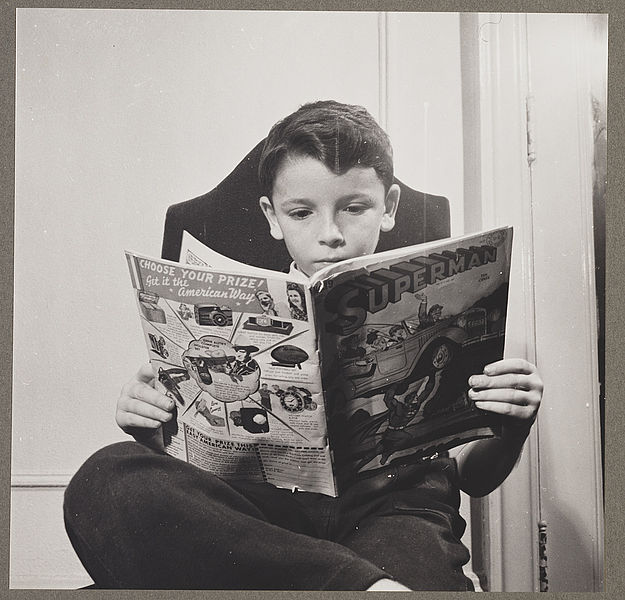Winner of the Fall 2016 StMU History Media Award for
Best Featured Image
Best Article in the Category of “United States History”
During the Great Depression and World War II, most Americans wanted to find happiness in anything. Throughout this era, there were not many places people could find happiness; so they began looking for entertainment in books. However, these were not just any ordinary types of books; they were indeed comic books.

Malcolm Wheeler-Nicholson was the founder of the first comic magazine, which was called New Fun. Although his comic did poorly, Malcolm was able to create a company called Detective Comics. The company was able to create a new magazine called Action Comics, founded in 1937.1 But before Malcolm was able to publish the new magazine, he fell into bankruptcy. Disregarding his personal setback, the company carried on without his involvement. The first issue in Action Comic was published in 1938. The comic consisted of an abnormal man who had incredible strength and wore a skintight suit, commonly known as Superman. In the span of a year, Superman had received his own book title and sold over 1.2 million copies per issue. It later became a radio show in 1940, opening with the phrase “It’s a bird! It’s a plane! No, it’s…Superman!”2 Eventually other publishers began developing their own superheroes as well. The second comic, which was produced in 1939, is the now popularly known comic series Marvel Comics. By 1940’s Superman was joined by other heroes such as: the Human Torch, the Sub-Mariner, Batman, the Flash, and Wonder Woman.3 In fact, Wonder Woman was meant to represent the importance of women in the war effort. During the boom of new superheroes being created, Superman was still the most popular of them all.

Unfortunately the comic industry was attacked by educators, psychiatrists, journalist, and even the federal government. They believed comics had no beneficial outcomes for society; instead of bringing entertainment, they were promoting ideas of violence and crime. They also believed that not only did the comics bring harmful thoughts to young minds, but the thin paper was supposedly destroying their eyesight.4 Despite the numerous complaints, Congress took no legal action against the publishers of the books. With this incident, it helped create a trade system, known as the Comic Codes, to help prevent indecency in the industry.5
No one could have guessed that comic books would have created some issues for years to come. For example, various art teachers discovered that the students who disliked and were performing poorly in art class, were the same students who had an interest in comic books; they were often getting into trouble for sketching comics instead of paying attention.6 The students wanted to get away from reality and what better way to do so than by creating your own story-line in a comic book?
That is the whole reason comic books were created, to help distract people from the tough times they were experiencing in life. That is why most people enjoyed them, because they wanted to escape reality by reading about situations that could never happen in real life, by flooding the minds of people of all ages with imagination. It is not hard to see why Americans would be very entertained by the concept of superheroes; they were created to help prevent disasters and to comfort those who were frightened by real-world events. For that reason this era was the perfect time for comic books to emerge. Some people were opposed to them, but in general they helped society in several ways. Although comics may not be as popular as they once were, it gave Americans a new world to discover, even if it was just imaginary.
- Alan Brinkley, American History: Connecting with the Past Volume 2, 15 edition (New York, NY: McGraw-Hill Education, 2014), 676. ↵
- Brinkley, American History: Connecting with the Past Volume 2, 676. ↵
- Brinkley, American History: Connecting with the Past Volume 2, 676. ↵
- Robert L. Coard, “The Comic Book in Perspective,” Peabody Journal of Education 33, no. 1 (1955): 18. ↵
- Brinkley, American History: Connecting with the Past Volume 2, 677. ↵
- Jay Berkowitz and Todd Packer, “Heroes in the Classroom: Comic Books in Art Education,” Art Education 54, no. 6 (2001): 12. ↵



118 comments
Jose Chaman
This is a really amazing article, brief but precise and really strong. I had never ventured to learn more about the origin of the comics, so I found the relation between them and the Great Depression interesting, and how it helped somehow to distract the little ones from such difficult times. The comics marked a before and after in the conception of entertainment, and in themselves, they represent a paper hero.
Mara Martinez
This article was extremely well written and super interesting to read! I myself am not a comic reader but reading about how they helped people was very cool and makes me happy that something so small can help others. I didn’t really think about how much the journalists had to struggle to figure out the certain components of each comic. It kind is funny that they thought comics were destroying eyesight, kind of ridiculous.
Sydney Hardeman
This was a great and interesting article. I did not know that the government, educators, psychiatrists, and journalists had issues with comics as far as the components of the comics and the fact that they felt comics were destroying eyesight. It was cool reading about the history of comics and why they started, and the inspiration that the creators of Superman had in creating the legendary hero.
Marco Montes de Oca
I never knew that the creation of comic books caused such a dispute. I never thought that comic books could have a negative side to them. I agree with the article when it says that they were created to help people distract themselves through tough times and escape reality. Had they put an end to comic books then there’s a really good chance that some of the most famous movies and characters that we know today never exist.
Amanda Quiroz
Honestly, I have never seen comic books as a way of promoting violence. Growing up, kids my age seemed to love superheroes. They still do! I was never a big superhero person but it was interesting to read about how Superman paved a pathway in the comic book world. I do think the creation of comic books had a great purpose in such a time period.
Charli Delmonico
This article was very interesting! I had no idea that comic books weren’t absolutely loved whenever they first came out. I never thought of them as promoting violence, and I’m glad the government didn’t do away with them entirely back then because they have inspired so much creativity today. I can’t imagine our lives without some kind of super-hero comic or without the Marvel movies. Everyone seems to really rally around those ideas and stories.
Kathryn Martinez
I remember reading Superman comics growing up and watching all of the original movies as an escape from reality. However, until now I had no clue that the comics were in danger because of the Federal Government, it seems so unrealistic. This fact alone surprised me greatly. But in today’s time, the superhero is very beloved and it makes you wonder what life would have been like without the development of superheroes in media culture.
Doan Mai
Growing up, I was not such a massive fan of comics. However, the article amazed me that comic books were created during the Great Depression of the U.S, which caused various losses not only to America but also to countries all around the world. I agree that comics were made to help people escape real life to a world with justice and equality.
Doan Mai
I am not a big fan of comic books during my childhood. However, the article amazed me that comic books were created during the Great Depression of the U.S, which caused various losses not only to America but also to countries all around the world. I agree that comics were made to help people escape real life to a world with justice and equality.
Eliezer Leal
I can agree that comics were made as an escape from the real world and its problems. First comic I picked up was Spider Man, the web head has definitely had a prominent role in comic books. Comic books to me were always fun to read because as the article says they were an escape from the real world and an entrance to imagination.